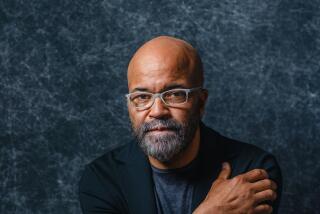With âSoulâ and âOne Night in Miami,â Kemp Powers finally hits his artistic stride

Kemp Powers is having the sort of year that fledgling screenwriters dream about. After two decades as a journalist, and a few more years as a playwright, Powers has seen his first two screenplays turn into two of the yearâs most celebrated films: Regina Kingâs directorial debut âOne Night in Miami,â and Pixar Animationâs existential comedy âSoul.â
Speaking via Zoom from his home in Los Angeles, Powers acknowledges that heâs living an unlikely success story. âI just turned 47,â he says. âMy playwriting career began at 40, and my screenwriting career began at 46, which is way past the date at which youâre supposed to give up.â
For years, Powers had written creatively on nights and weekends while devoting himself to his journalism career. But several years ago, after yet another media layoff, he decided to make a bet on himself. With his severance package and some stock options in hand, he decided to âfinally take a leap of faith and say that Iâve got a two-year window to make this dream of mine come to fruition.â
âAlmost like a stroke of luck, just when my journalism career was beginning to contract, that thing Iâve been doing as a hobby for so many years was starting to get attention. âOne Night in Miamiâ was actually my first play, produced at an Equity-waiver theater on Pico Boulevard across from Roscoeâs. There was no expectation of it turning into anything else. To be perfectly honest, even my playwriting career caught me a little off guard.â
âMiamiâ dramatizes a real-life 1964 encounter between four young Black luminaries â Malcolm X, Muhammad Ali, Jim Brown and Sam Cooke â in a Florida hotel room. The drama finds the men navigating a historical crossroads, caught in a high-stakes debate about power, race and social responsibility.
âI had actually been researching the friendship between those four men for years, with the intention of writing a book,â Powers says. When he started taking playwriting more seriously, âMiamiâ was the first full-length idea that came to mind, because âIâd done so much research on each of the four men that I almost felt like I had their voices in my head.â
Later, he developed âMiamiâ into his first film script, and it caught the attention of Oscar-winning actress Regina King, who came on as a first-time director.
The film, which premiered at the Venice Film Festival, has been acclaimed as a vivid and timely reflection on Black masculinity and racial injustice.
Powers was drawn to historical figures who were âunapologetically Black,â and he sees a parallel between the filmâs Cassius Clay and such outspoken contemporary icons as Colin Kaepernick and LeBron James.
But he says he conceived of âMiamiâ as historical fiction and admits to finding the filmâs contemporary resonance âa little bit depressing.... It was never meant to be written for today. It was meant to be a characterization of these guys to inspire young people, to understand that these movements are youth movements.â Powers adds that âwhat I look forward to is when itâs a time capsule.â
At the very least, Powersâ other new film is a demonstration of his creative range. If âOne Night in Miamiâ is an intimate, intense chamber drama, Pixarâs âSoulâ is a dizzying animated fantasy that moves effortlessly between different dimensions.
Itâs also the first Pixar movie to feature a Black protagonist. After deciding to make the lead character, Joe Gardner, a New York-based jazz musician, director and Pixar veteran Pete Docter tapped Powers to come onboard as a screenwriter.
âWhen they brought me on,â Powers says, â[âSoulâ] was still early in its development. And it was a film about a middle-aged Black man from New York who finally got his artistic break in his mid-40s. Hello!â
Given how much Powers related to the character, he poured his personal experiences into the âSoulâ script. âThe conversations between Joe Gardner and his mother are variations on conversations Iâve had with my own mother. Itâs not autobiographical ... but [also] it kind of is.â
By the time Powers was done writing the script, he had put so much of himself into the film that Docter made him co-director. âFrom the very beginning,â Powers says, âthey wrapped me into a lot more of the process than just the screenwriting.â
âIâm a good learner by osmosis,â Powers says. âIt was like âThe Karate Kidâ for me, where I was painting the fence and waxing the cars and then, a year in, [Docter is] like, âOh, I want you to be co-director.â And I asked him, âWell, what does that mean?â And heâs like, âYouâve already been doing it.ââ
Pixarâs creative process, which involves a Braintrust committee that provides regular creative input on the storytelling, might overwhelm a first-time writer-director, but Powers took it in stride.
âI understand the mystique of the Braintrust,â Powers says, âbut ultimately itâs just a group of very talented peers trying to help you make your film better. Now, look, when you have a bad screening, three hours of notes tearing your film apart is not fun. But it keeps you having a critical eye on your work as youâre making it.
He adds: âIn the Olympics, thereâs marathon runners, and thereâs sprinters. Making a Pixar film is like sprinting â the distance of America.â
More to Read
From the Oscars to the Emmys.
Get the Envelope newsletter for exclusive awards season coverage, behind-the-scenes stories from the Envelope podcast and columnist Glenn Whippâs must-read analysis.
You may occasionally receive promotional content from the Los Angeles Times.










